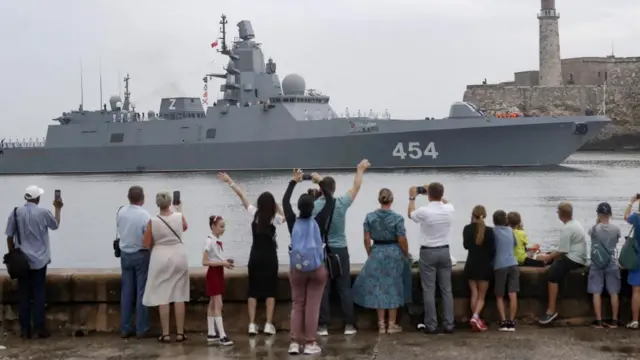In recent years, the sight of Russian navy ships docking in Cuban ports has stirred a mixture of geopolitical intrigue and historical nostalgia. This development underscores the evolving dynamics between Russia and Cuba, reflecting broader global strategic interests. The arrival of Russian naval vessels in Cuba, while seemingly symbolic, carries significant implications for international relations and regional security.
Historical Context and Strategic Significance
To understand the contemporary significance of Russian navy ships in Cuba, it is essential to consider the historical context. During the Cold War, Cuba was a key ally of the Soviet Union, serving as a critical outpost in the Western Hemisphere. The Cuban Missile Crisis of 1962 exemplified this strategic relationship, as the Soviet Union’s deployment of nuclear missiles in Cuba brought the world to the brink of nuclear conflict.
After the dissolution of the Soviet Union in 1991, the relationship between Russia and Cuba experienced a period of decline. The collapse of the Soviet Union led to a significant reduction in Russian support for Cuba, which, coupled with economic challenges, left the island nation struggling. However, recent years have seen a resurgence of interest and cooperation between the two countries, driven by shifting global dynamics and strategic interests.
Recent Developments and Naval Deployments
In the 21st century, Russian naval ships making port calls in Cuba have become a symbol of renewed Russian-Cuban relations. These visits are often accompanied by discussions of deeper military cooperation and strategic alignment. For instance, Russian navy ships have periodically visited Cuban ports, such as Havana, highlighting the rekindling of military and defense ties between the two nations.
The arrival of Russian naval vessels in Cuba serves several strategic purposes. First, it allows Russia to project power and influence in the Western Hemisphere, a region traditionally dominated by the United States. By establishing a visible presence in Cuba, Russia aims to demonstrate its capacity to operate in the U.S. sphere of influence and reinforce its role as a major global player.
Second, these naval visits enable Russia to engage in joint exercises and training with the Cuban military, enhancing bilateral defense capabilities. Such collaborations are valuable for both countries, as they provide opportunities to share expertise and strengthen military readiness. For Cuba, the presence of Russian naval vessels offers a form of security cooperation and support amidst ongoing economic and political challenges.
Geopolitical Implications and Reactions
The deployment of Russian navy ships to Cuba has not gone unnoticed by other global actors, particularly the United States. Washington’s response to these developments reflects its concerns about Russia’s intentions and the potential implications for regional stability. The U.S. has historically viewed Cuba through a lens of strategic importance, and the presence of Russian military assets in Cuban waters is seen as a direct challenge to American influence.
The U.S. government has expressed apprehension about Russia’s growing military presence in the region. Analysts suggest that these naval visits could be part of a broader strategy by Russia to counterbalance American hegemony and assert its interests in various geopolitical arenas. The situation underscores the tense and complex nature of international relations, where actions by one nation often elicit reactions from others, shaping the global security landscape.
Economic and Military Cooperation
Beyond the symbolic value of naval visits, the Russian-Cuban relationship encompasses substantive economic and military cooperation. In recent years, Russia has engaged in several joint projects with Cuba, including investments in energy and infrastructure. The renewal of economic support and military aid signifies a strategic partnership that benefits both countries.
For Cuba, Russian support is crucial in maintaining its military capabilities and enhancing its strategic position. The Cuban government views the partnership with Russia as a means to bolster its defense capabilities and counterbalance its reliance on the United States. Russia’s provision of military equipment and training contributes to Cuba’s overall defense posture.
For Russia, the partnership with Cuba aligns with its broader objectives of countering American influence and strengthening its presence in key regions. The strategic value of having a foothold in the Western Hemisphere, coupled with economic interests, makes the relationship with Cuba an important aspect of Russia’s global strategy.
Challenges and Future Prospects
While the presence of Russian navy ships in Cuba reflects a strengthening of ties, the relationship is not without its challenges. Economic constraints, political dynamics, and regional instability can impact the depth and sustainability of the partnership. Both countries face their own set of internal and external challenges that may influence the trajectory of their cooperation.
Looking ahead, the future of Russian-Cuban relations will likely be shaped by evolving geopolitical dynamics and domestic considerations. The partnership’s success will depend on the ability of both nations to navigate complex international relationships, address economic challenges, and sustain mutual interests.
Conclusion
The arrival of Russian navy ships in Cuba represents more than just a naval deployment; it is a manifestation of the strategic and symbolic dimensions of international relations. While reminiscent of Cold War-era alliances, these modern interactions are driven by contemporary geopolitical considerations and mutual interests. The presence of Russian naval vessels in Cuban ports highlights the enduring significance of Cuba in global strategic calculations and underscores the ongoing evolution of Russia’s role on the world stage.
As Russia and Cuba continue to navigate their partnership, the broader implications for regional and global security remain a subject of interest and scrutiny. The dynamics of international relations are constantly evolving, and the interactions between Russia and Cuba serve as a microcosm of the complexities and intricacies of modern geopolitics.
